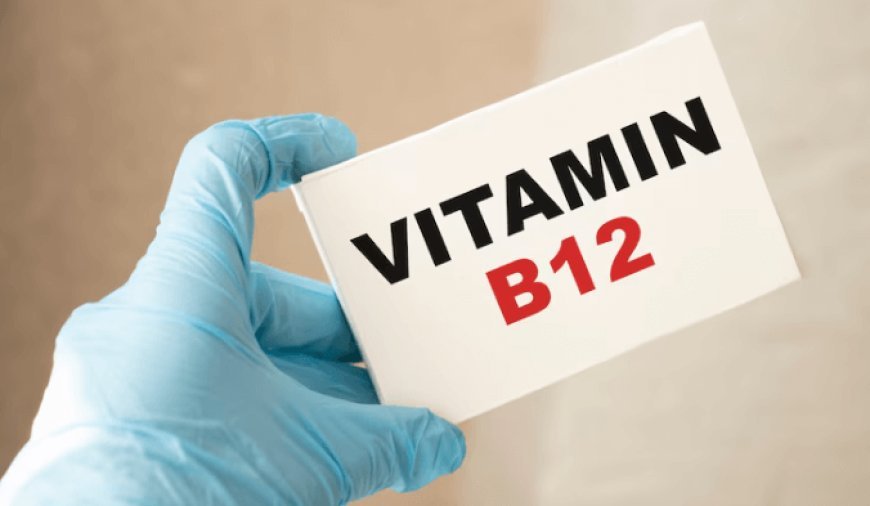Vitamin B12 Deficiency: Causes, Symptoms, and Testing

Imagine waking up every day feeling tired, even though you slept through the night. You struggle with brain fog, occasional dizziness, and a tingling sensation in your hands and feet. These could be signs that your body is lacking a vital nutrient - vitamin B12.
Why Is Vitamin B12 Important?
Vitamin B12 plays an important role in our overall health. It helps produce red blood cells, supports brain function and keeps the nervous system running smoothly. A deficiency can lead to a variety of health problems, some of which can be serious if left untreated.
What Causes Vitamin B12 Deficiency?
Several factors can contribute to a lack of Vitamin B12 in the body. Some of the most common causes include:
-
Dietary Deficiency – People who follow a vegetarian or vegan diet are at a higher risk of developing a Vitamin B12 deficiency. This is because B12 is naturally found in animal-based foods such as meat, fish, dairy, and eggs. Since plant-based foods do not provide sufficient amounts of this essential nutrient, those who avoid animal products need to rely on fortified foods or supplements to maintain adequate levels. Without proper planning, a plant-based diet can lead to insufficient B12 intake, which, over time, may cause deficiency-related symptoms.
-
Absorption Issues – Even if someone consumes enough B12-rich foods, their body may not absorb it properly. Certain medical conditions, such as pernicious anemia, celiac disease, and Crohn’s disease, can interfere with the body's ability to absorb Vitamin B12 from food. Pernicious anemia, for instance, occurs when the immune system attacks the stomach cells that produce intrinsic factor, a protein required for B12 absorption. Similarly, damage to the intestines caused by conditions like celiac or Crohn’s disease can reduce the absorption capacity, leading to deficiency despite an adequate dietary intake.
-
Aging – As we age, our digestive system undergoes changes that can make it harder to absorb Vitamin B12. The stomach produces hydrochloric acid, which is essential for releasing B12 from food. However, older adults often produce less stomach acid, making it difficult to extract and absorb the vitamin effectively. This is why Vitamin B12 deficiency is more common among seniors, even those who consume a well-balanced diet. To counter this, healthcare providers often recommend B12 supplements or fortified foods for older individuals.
-
Medications – Certain prescription and over-the-counter medications can interfere with Vitamin B12 absorption. Antacids and proton pump inhibitors (PPIs), commonly used to treat acid reflux and heartburn, reduce stomach acid production, which in turn hampers B12 absorption. Metformin, a medication frequently prescribed for diabetes, can also affect how well the body absorbs Vitamin B12 over time. Long-term use of these medications without proper monitoring can increase the risk of deficiency, making it important for individuals on such treatments to discuss B12 supplementation with their doctors.
Recognizing the Symptoms
Vitamin B12 deficiency can manifest in many ways. Some people may have mild symptoms, while others may face more serious problems. Here are some common signs to look out for:
-
Fatigue and weakness
-
Memory problems or difficulty concentrating
-
Numbness or tingling in hands and feet
-
Mood swings or depression
-
Pale or jaundiced skin
-
Shortness of breath and dizziness
Take my friend Sarah, for example. She had been feeling sluggish for months and thought it was just stress. But when she started feeling dizzy and having memory lapses, she decided to get tested. Sure enough, her vitamin B12 test results showed she had a vitamin B12 deficiency.
The Importance of Testing
If you suspect you have a vitamin B12 deficiency, the best way to confirm it is with a vitamin B12 test. This simple blood test measures the levels of B12 in your system and helps doctors determine if supplementation is necessary.
I remember when I first got my vitamin B12 tested. I was feeling unusually tired and struggling to concentrate at work. The results showed that my levels were borderline low. A few months of consuming B12-rich foods and supplements made a huge difference in my energy levels.
How to Maintain Healthy B12 Levels
Preventing a deficiency is easier than you might think. Here are some simple ways to keep your Vitamin B12 levels in check:
-
Eat B12-rich foods – Include meat, fish, eggs, dairy, and fortified cereals in your diet.
-
Take supplements – If you're vegan or have trouble absorbing B12, a supplement may be necessary.
-
Get tested regularly – If you’re at risk, a routine check can help you stay on top of your health.
Final Thoughts
Vitamin B12 deficiency is more common than many people realize, but the good news is that it is completely manageable with the right approach. If you are experiencing fatigue, memory problems, or tingling sensations for no apparent reason, don't ignore these signs. Get a vitamin B12 test, change your diet if needed, and take care of your health.
What's Your Reaction?


































































